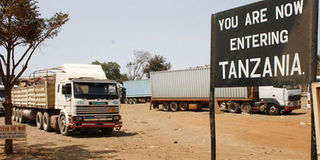Impact of Covid-19 on trade and development in EAC

Trucks wait to cross into Tanzania from Kenya at the Namanga border post. PHOTO | FILE | NATION MEDIA GROUP
What you need to know:
- Governments are racing to implement measures to avoid a situation like Italy’s, where cases skyrocketed before lockdowns were put in place.
- The region stands to be affected by shortages of raw materials, capital goods, and delays in getting consumer goods which were originally imported from the Asia region.
The East African Community (EAC) stands to be affected by shortages of raw materials, capital goods and delays in getting consumer goods, which were originally imported from the Asia region.
Following the first reports of Covid-19 in mainland China in late 2019, over 300,000 people have since died of the disease, with over five million infections reported worldwide.
To limit infections, several countries in Asia, Middle East, Europe and the Americas have banned large gatherings and imposed strict travel restrictions.
The global pandemic will most likely continue as efforts to find a potential cure are made.
STRICT MEASURES
South Korea has started seeing the reduction in the number of Covid -19 cases after it moved swiftly to implement tough measures. The same was seen in China.
Governments are racing to implement safety measures to avoid a situation like Italy's, where cases skyrocketed before lockdowns were put in place.
In Africa, the Covid-19 cases present a significant challenge to the EAC economies due to the countries' links with the world economy.
EAC trade is set to be affected negatively, given the region's trade ties to China, Europe and the Middle East, which are among the regions heavily affected by the pandemic.
The region stands to be affected by shortages of raw materials, capital goods, and delays in getting consumer goods from the Asia region.
Already some EAC states are experiencing declines in imports from China, including raw materials, capital goods, intermediate goods, and final products.
However, medical supplies and essential goods are coming into the region.
Kenya's imports from China plunged by Sh58.64 billion in January and February on the back of the outbreak, signalling possible supply disruptions of household goods and raw materials across Africa.
IMPORTS DECLINE
Provisional import data from Kenya shows the value of goods ordered from China in January and February dropped by 36.63 per cent compared to a similar period in 2019.
On the contrary, trade has emerged as a remedy that can mitigate this adversity through the flow of essential goods, like food and medical supplies.
Of importance to the EAC economies is the nature of informal cross-border trade, which is mostly conducted by small and unregistered traders. Their contribution is estimated to account for an average of about 40 per cent of the GDP in EAC economies.
EAC member states (Burundi, Kenya, Rwanda, South Sudan, Uganda and Tanzania) recently met to discuss the recovery strategy and a coordinated approach to mitigate the impacts of the crisis.
The Heads of State received reports from health, trade, transport and EAC affairs ministries on regional Covid-19 response.
The states resolved to adopt a harmonised system for certification and sharing of the virus test results and improved flow of goods and services.
The region's key economic sectors like agriculture, trade, manufacturing, tourism, hospitality and entertainment are expected to continue experiencing a slow down because of the pandemic.
Therefore, partner states must support local production of essential medical products and supplies - including masks, sanitisers, soaps, coveralls, face shields, processed food and ventilators - as part of efforts to combat the outbreak.
The Heads of State further directed partner states to facilitate farming, support agro-processing and value chains as an import substitution measure, and establish special purpose financing schemes for small and medium enterprises to cushion them from the effects of the pandemic.
AGRIBUSINESS OPPORTUNITIES
Private sector companies like East African Breweries Limited and Bidco Africa have already contracted small-scale farmers to produce and provide raw materials like barley, sorghum, wheat, soya beans and sunflowers.
This is creating entrepreneurship, revenue for farmers and agribusiness opportunities.
The African Continental Free Trade Agreement (AfCTA) remains on the radar to increase intra-Africa trade, competitiveness and innovation.
The creation of employment and continued governments' support to all private sector industries is critical.
The partner states are especially keen on allowing faster free movement of essential and non-essential goods within and out of EAC, as they consider full liberalisation of open skies for free movement of cargo.
Meanwhile, the addition of health workers at borders will be focal in enhancing regional mechanisms for testing and certification of truck drivers.
Embracing the use of technology is inevitable, especially at this moment when social distancing is billed as a key step in stemming the spread of the virus.
ONLINE TRANSACTIONS
Technology will be important for online transactions in the sourcing of products from outside EAC, and in improving self-sufficiency, especially for private sector players.
One of the long-term strategies should be to push for "Buy East Africa, Build East Africa".
Partner states need to provide support to key industries to expand their capacity and establish new industries to manufacture import substitutes in the region.
This will cushion the EAC economies from the impacts of Covid-19 and facilitate the private sector to increase the production of manufactured goods.
The various tax reductions that have been implemented and the much awaited Value Added Tax refunds are expected to support private sector business as approved earlier by Kenya government.
Chris Diaz is Director East Africa Business Council and Brand Africa Trustee



